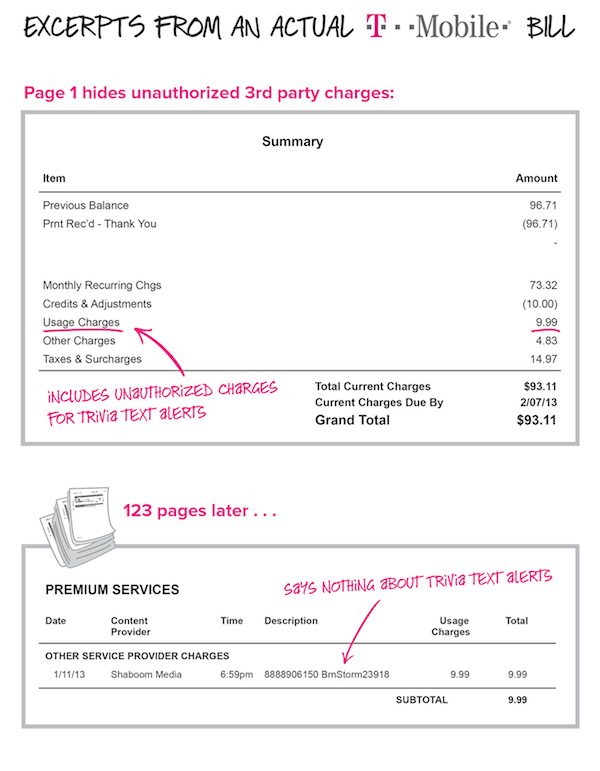
We know that there are a lot of scumbags out there who will try to contact you via your cell phone either by calling or texting in which they have dubious intentions, often trying to part you from your hard earned money. Many of us have come to recognize these spammy scam artists, however there is one group that we often don’t consider when trying to protect ourselves from scams, and that is the cell phone companies themselves.
While we at The Frugal Caller do our best to help find consumers the cheapest mobile phone deals available, one thing that we should point out as a good frugal habit is to make sure that whatever cell phone carrier you are using isn’t trying to screw you over with unnecessary fees and charges. And I’m not talking about late fees or anything like that, I’m talking about deceitful dubious fees which are meant to trick mobile phone users into useless recurring charges on their monthly phone bills.
Beware of Cell Phone Cramming
One of the most common cell phone company scams in which you may find extra fees and charges on your phone bill is a concept known as cell phone cramming. Cell phone cramming is when your mobile phone carrier allows a third party company to add charges to your phone bill without disclosure or without your consent.
Cramming is a form of fraud in which small charges are added to a bill by a third party without the subscriber’s consent or disclosure. These may be disguised as a tax or some other common fee, and may be several dollars or even just a few cents. The crammer’s intent is that the subscriber will overlook and ultimately pay these small charges.
T-Mobile’s Bogus Charges
Recently in the news, T-Mobile has been accused of the scam known as cell phone cramming for many of its subscribers by the FTC.
The Federal Trade Commission has alleged that T-Mobile allowed third parties to charge its customers for text message services for things like daily trivia, daily horoscopes, flirting tips, and celebrity gossip stories. Many of the users were not aware that they were being charged for this and as many as 40% of the customers hit with those fees asked for refunds.
Below is an actual example of one of T-Mobile’s bills highlighted by the FTC which shows the bogus “crammed” charges which are clearly concealed to look like a common monthly fee or tax.

As you can see from the example phone bill, the charges for $9.99 is labeled as “usage charges” in the bill’s phone summary. Even when you dig further into the bill detail, that same $9.99 charge has an itemized description that is incredibly vague and confusing showing a string of numbers and abbreviations, with no indication that it is for a texting subscription.
Of course T-Mobile has publicly denounced the allegations as being overblown and not a common practice. It does appear that the high point of these complaints was in 2012 and appears that the company is being more transparent on these types of charges now.
With T-Mobile’s push for its no-contract cheap cell phone plans and its fight against competitors AT&T and Verizon, it would be in T-Mobile’s best interest to stay on the side of consumers’ trust and not allow these scumbag third party scammers any access to their mobile phone customers at all.
How To Identify Scam Charges on Your Phone Bill
The best way to find and identify fraudulent third party charges on your phone bill is to make sure you actually read and review it every month. I realize that this may seem obvious, but in today’s culture of automatic bill payments, many of us have a “set it and forget” attitude when it comes to bill payments. And the easiest way for someone to get scammed on their phone bill is for them to not even pay attention to it.
The FTC has the same advice, each month read over your bill and if you see a charge you don’t recognize then first call your cell phone company for an explanation of the charge.
If you do find a cell cramming charge on your bill and aren’t able to resolve the issue with your phone company then you can file a complaint with the FTC here.
It’s not just T-Mobile that we should be weary of, but all telecom companies. The best way to defend yourself against these kind of mobile phone company scams is to be informed of what and how that company charges you.
